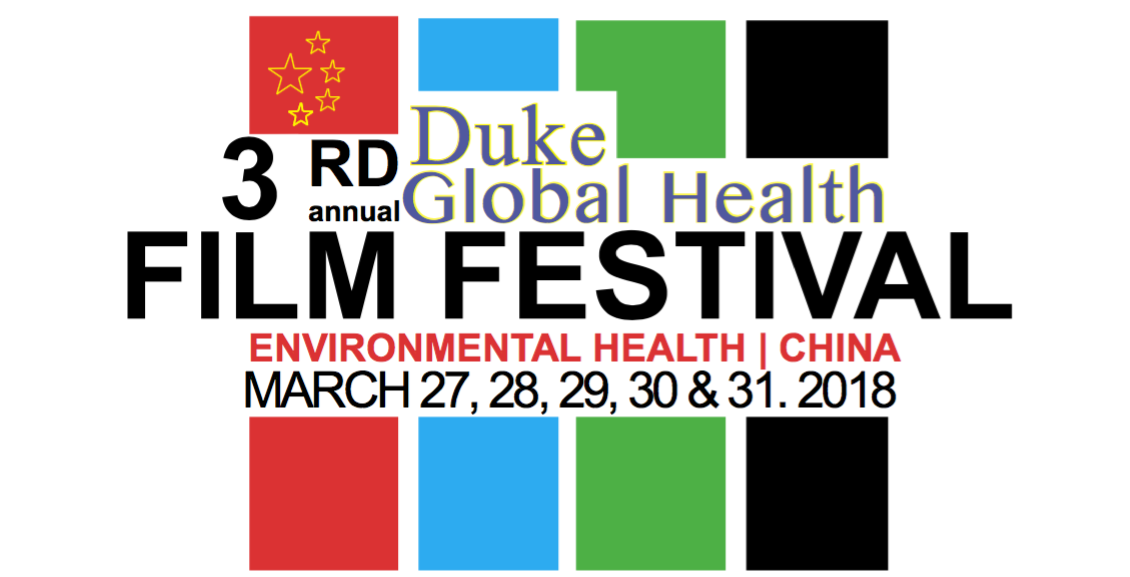About DGHFF
About
Duke Global Health Film Festival (DGHFF) is an initiative launched by Kearsley Stewart, Associate Professor of Global Health and Cultural Anthropology, and Jamal Edwards, a senior majoring in Global Health and Journalism after attending the world’s inaugural Global Health Film Festival, an initiative started by the Bill & Melinda Gates Foundation, the Lancet, the Royal Society of Medicine, and the London School of Hygiene and Tropical Medicine. Professor Stewart and Jamal were keen on bringing this unique approach to global health to Duke. DGHFF started with a grant from the Duke Africa Initiative and quickly gained support from the Duke Global Health Institute, the Franklin Humanities Institute and many others.
Since 2017 Miguel Rojas, film scholar and curator, and director of the NC Latin American Film Festival joined the team increasing programing, content, films and outreach of the event.
DGHFF 2018 Theme Statement
It is well know how the rise of China as an economic power has taken a tool in their environment and general health of the Chinese population. Since the outbreak of the 2008 financial crisis, the Western world has increasingly pointed to China as the potential savior of global capitalism. This is based on the economic thesis that demand of Chinese consumers, which has been pumped up by increasing governmental spending in infrastructure, urban renewal, and social welfare programs would stabilized the global market place. China’s potential to inject new energy into the sluggish world economy was a reality. Today China is looking at ways to address many of the externalities of such process, some directed to their social and environmental concerns that were put aside as it rise to the global stage. Filmmakers have been looking at these process of development with critical eyes. Air and water pollution, soil degradation, waste management, urban growth, mass displacement, etc., are some of the topics they have been looking at. This edition of the GHFF would examine some of these issues from: air pollution in UNDER THE DOME (2015), waste management, recycling, and environmental justice in PLASTIC CHINA (2016), to environmental degradation in BEHMOTH (2015). Each film functions as a time capsule that with unique formal and subject matter strategies take the audience in visual journeys to issues of local concerns with global breath. MRS
DGHFF 2017 Theme Statement
This year the program explores the impact of Zika, and other infectious diseases, traditional medical practices, public health and human rights, and the impact of migration on heath focusing on women’s lives in the Americas and the U.S. 9 films, representing 7 countries, with participation of filmmakers Debora Diniz (Brazil), Mauricio Andrada (Mexico), Daniela Abad (Colombia), and Esteban Ramirez (Costa Rica). For the first time the GHFF features a student competition for short films (less than 10 minutes) addressing an issue of importance in global health. The competition is open for students (undergraduate and graduate) at Duke and UNC-Chapel Hill. MRS
DGHFF Leadership
Kearsley Stewart, Duke Global Health Institute (DGHI)
Miguel Rojas-Sotelo, Duke Center for Latin American and Caribbean Studies (CLACS)
Thomas Johnson, Health Humanities Lab at FHI
Student Film Festival Organized by: John Bollinger, Duke Student
Thanks to many who had support the GHFF
Niel
2017. Bethzaida Férnandez, Duke Romance Studies Department, Spanish Language Program (SLP)
2017. Screen Society at Arts of the Moving
DGHFF Theme Statement 2016
This year’s theme is “Infectious Disease and Visual Representation in Africa” which aims to bring together a global network of filmmakers, health professionals, academics, and students to discuss global health ethics and the narrative representation of infectious diseases in film in Africa. As a chronic disease, HIV/AIDS biomedically, politically, and artistically has a diverse and well-defined archive of stories to study trends, outcomes, and key players from initial outbreak to today. Some of the most compelling engagements with the narratives of the movement are nested in films that serve as visual representations, cultural preservation, and agents of change. Global health films, specifically, identify a unique view of the world’s response to HIV/AIDS in Africa. Similar, but quite distinct, visual storytelling is emerging from the most recent Ebola outbreak in western Africa and the chronic TB epidemic in South Africa. Global health films animate these illness narratives, at once strengthening African voices behind the headlines but also reinforcing the chaos narrative so commonly associated with the continent. This proposed film festival, and the expert panel, will challenge those stereotypes and offer a new perspective on understanding the visual representation of disease in Africa documentaries.
DGHFF 2016 Leadership
Kearsley Stewart, Associate Professor of the Practice, Global Health and Cultural Anthropology, is thesis advisor to Jamal Edwards and will supervise his independent study in global health film, Spring 2016. She teaches undergraduate and graduate courses on global health ethics, qualitative research methods, and HIV/AIDS.
Jamal Edwards, T’16, is a double major in Global Health and Journalism. He is currently writing his thesis, “Making Room for Film in the Global Health Community.” Jamal will help coordinate this Duke Africa Initiative project and speak on the panel. As a Writ Large Humanities Fellow, Jamal is receiving support from the Center of Documentary Studies for his research.
Jenny (Jingwei) Li, T’16, is a double major in Global Health and Sociology, with a certificate in the Study of Ethics. Her global health honors thesis is on building anesthesia workforce capacity in Ghana through distance-based education, and her sociology honors thesis is on facilitating social adjustment for former members of cults/New Religious Movements. Jenny is the designer of this website and will also lead video documentation of the film festival.
